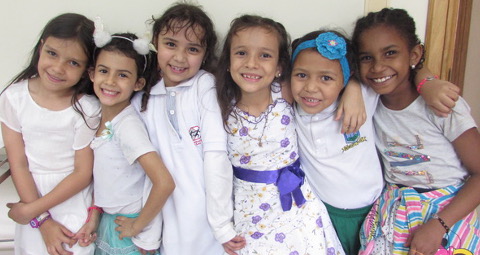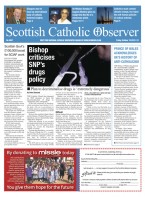BY Ryan McDougall | May 17 | ![]() 0 COMMENTS
0 COMMENTS ![]() print
print

Streets ahead: The charity helping Venezuelan refugees in Columbia
In a special report, Ryan McDougall speaks to the priest who founded a charity to help destitute children and discovers why he is now striving to help refugees arriving in Columbia.
Venezuela is currently in turmoil. In recent years, well over three million nationals have fled their home country due to food shortages brought on by long-standing political problems fuelled by an economic collapse.
It is estimated that 5000 families flee to the borders every day, and the figure of displaced peoples is estimated to rise to more than five million by the end of the year.
Venezuela has the largest oil reserve in the world, yet is currently in the midst of its worst ever economic crisis.
The cause of this stems back decades, an example being fluctuating and decreasing petrol prices in the 1990s, 2000s and even earlier.
Economic crisis
In 1998, the former president Hugo Chávez had set up a variety of social programmes to help tackle poverty that employed labour from thousands in neighbouring countries such as Cuba.
The oil money in Venezuela was thus used to support assisting countries, and due to the decrease in price, it became unsustainable as profits fell short—the catalyst in a chain of events that spiralled out of control.
For over a decade, Venezuela’s government tried to address the issue by printing more money, leading to a serious inflation.
Last year, they switched currency, replacing the bolivar with the bolivar soberano. This has not addressed the issue, and inflation is projected to continue to rise by roughly 1000,000 per cent.
Unrest
The reality of this has seen Venezuelan citizens stand outside convenience stores for hours to buy simple necessities such as bread and baby formula.
As a result of the economic crisis and the other issues within the country, nationals are fleeing, largely to neighbouring countries in South America which are reported to have been generally welcoming of their brothers and sisters.
The majority of refugees have fled to Colombia, where, unlike other countries bordering Venezuela, the welcome from local people and the government has been hospitable.
This has come at a price, as many Venezuelan families seeking refuge in Columbia have been unable to send their children to school, put clothes on their backs, find food or a place to stay.
Let the Children Live
In Medellin, Columbia’s second-largest city, there is a UK charity that is making a difference.
Let the Children Live, founded by Fr Peter Walters, is based in Medellin, and since 1992 it has worked with the city’s street children, many of whom have left shanty towns as the streets offer a marginally better existence.
Fr Walters founded the charity after taking a holiday in the Colombian city.
Shaken by the conditions which the street children were facing, he spoke to a local Catholic Archbishop who suggested that God may have been calling on Fr Walters to intervene.
An Anglican minister at the time, Fr Walters converted to Catholicism after returning to the UK and subsequently became a priest, with his heart set on changing the lives of as many children as he possibly could.
Right path
The charity aims to get youngsters off the streets and away from a bleak future of crime, gangs, drugs and worse.
Volunteer workers have helped integrate countless youngsters back into society and the charity has funded specially adapted school programme that accommodate their often chaotic lives. Many of the children have grown up to have happy, successful and settled lives in adulthood.
The influx of Venezuelan refugees has seen the small charity reaching out to help children from refugee families. Though they have adapted to the demands, the charity’s resources have been stretched thin.
In a Skype call from Colombia, Fr Walters said: “Normally we start helping children at seven years old, but we’ve now had to drop it to five. These families are leaving Venezuela out of desperation—last week we got to know the family of an eight-year-old boy who is diabetic. He needs insulin every day, and because of the crisis he couldn’t get it in Venezuela. Another boy is epileptic and couldn’t get the drugs he needs back home.”
In more need than ever
It costs Let the Children Live around £5 a week to feed one child, Fr Walters added, and with growing numbers, the charity is now in more need than before for donations to continue its work.
Despite the current tolerance of the government and local people, Let the Children Live is also concerned that attitudes may change for the worst as the refugee population grows.
“One must congratulate the government for being so generous in providing school spaces for the refugees,” Fr Walters said.
“Generally, the Colombians have been remarkably tolerant towards them so far but they are undercutting out of desperation the lowest paid people and, obviously, that is going to lead to tensions. Even the Venezuelan prostitutes are charging less that the Colombian ones.
“My fear is that if the numbers increase then so will tensions—in city centre areas this is becoming more so.”
‘Easy Targets’
Other issues facing the refugees include Medellin’s many street gangs. Fr Walters believes gang members see the displaced as ‘easy targets.’ He also fears they could become involved in gang crime and the gangsters’ lifestyle.
“Some of them are getting involved in crime and they will find natural allies and rivals,” he said.
“The risk of sexual exploitation of both adults and children is very great, too.”
Let the Children Live’s Scottish promoter George McAleenan said a 13-year-old boy and a young man, aged 18, who were receiving help from the charity were shot dead. The reason for their murders remains unclear.
Petty cash
Many of the Venezuelan refugees, including the children, have taken up odd jobs in order to afford a place to stay. Children can often be found selling sweets and collecting rubbish and recyclables for small amounts of cash.
“If they have a good day they can make as much as £5, but it’s at least £3.50 to rent a room for the night, and some properties are putting prices up or refusing to rent to families with kids because they have no insurance for them—these rooms are only being made available to adults,” Fr Walters said.
Although the situation in Medellin is poor for both the Venezuelan and Columbian children, Let the Children Live is making a genuine difference.
As well as their feeding and schools programme, the charity has been able to host special events, including a Christmas fundraiser which saw some 400 children receive gifts on Christmas day.
The charity is also working with the Medellin Archdiocese to help refugees secure accommodation. They face high costs and restrictions placed upon them by local landlords.
As Fr Walters explained: “The Archdiocese’s social affairs section has a programme that provides hostel accommodation for families until they get back on their feet.”
Colombia, he noted, is a majority Catholic country. He added: “The Church is at the centre of society for most people here—obviously we don’t discriminate based on that, but in terms of the cultural assimilation they speak the same language and are mostly of the same religion, which has helped prevent xenophobia and such.”
Call for support
Although the charity is currently keeping on top of the refugee crisis, as well as helping Medellin’s existing street children, its founder hopes more support will be forthcoming.
“A little Venezuelan boy told me, ‘to share is to live,’ and if we want these children to live then we need to share with them. One way we can share is by supporting charities like Let the Children Live,” Fr Walters said.
“This is an enormous humanitarian crisis—it’s our time to say these people very urgently need help, and the more children we can reach, the better.”
To support Let the Children Live visit www.letthechildrenlive.co.uk










